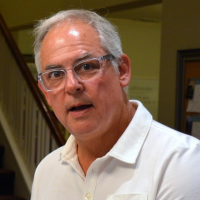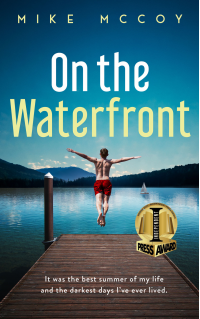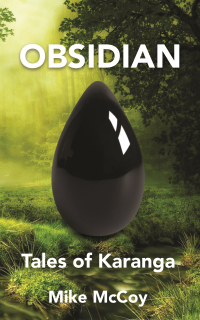Mike McCoy Interview Published on: 17, Mar 2023
 Where were you born, and what was your childhood like?
Where were you born, and what was your childhood like?
I was born in Salem, Oregon, in the great Pacific Northwest. I grew up during the 1960s and 70s in the small town of Springfield, Oregon in the shadow of lumber and paper mills. The town lay between two rivers and hills. While we lived in a subdivision of modern homes, the river, dirt bike trails, and forests were a short bike ride away. We played outside all the time. During the summers, we didn’t go inside until it got dark at 10 pm.
My parents divorced when I was seven. Our mother worked full time for social services. We were not well supervised. My siblings and the neighborhood kids experienced a vibrant, adventuresome youth. We made our own fun and trouble. It was a different time with no computers, no smart phones, or the internet. Heck, we didn’t have color TV until I was a teenager, and even then, we only got two channels. As adults, when we get together, the stories flow like wine, feeding our souls with the rich memories of our youth.
Were you an avid reader as a child? Do you still read books?I was not an avid reader as a child. My sister was. She devoured books. I remember she filled a huge empty bag full of paperbacks she’d read. Libraries intimidated me. There were so many books. How to choose a book I would like? I finally began reading in middle school. The most memorable book I read during junior high was The Hobbit.
As a teenager, what were you obsessed with?Because I was raised by a single mother and maybe because money was tight, I always worked. As a pre-teen, I mowed lawns and pulled weeds. During the summers, I picked beans. Most of the kids in our area picked string beans at Rodakowski’s bean field. It was great fun listening to the latest rock and roll songs on portable AM transistor radios, getting in bean fights, hefting buckets full of beans on the scale and getting your card punched for the weight, knowing you made four cents for each pound. When I turned fifteen, I got a job at the local Sizzler Steak House as a dishwasher. It paid $1.19 per hour. I wanted money to buy things, things I knew my mother couldn’t afford to buy for me, so I worked.
Your thoughts on conventional vs. self-publishing? What route did you choose and why?It’s a writers dream to have an agent, a big-time publisher and a book that sold a million copies, but I fear that’s not likely. Plus, the traditional route is slow. Once you’ve written your best manuscript, it takes time to find an agent, have the agent pitch the book, and once sold, it takes another year or two to get published. I didn’t want to wait that long, or go through that effort, so I have self-published.
I am a businessman. My career is sales and marketing, so I enjoy learning about the publishing industry. It has been an interesting experience discovering how and where to market my books and the best ways to spend marketing funds.
On the Waterfront is your latest release. What is it about?In 1978, Danny Novak, at thirteen, is hired to work at Camp Baker for the summer. He is the youngest boy on staff. Danny isn’t worried about his age. He’s confident he’ll fit right in, but quickly learns it’s not that easy.
When Danny fails the swim test to work on the waterfront, Mark, the bad boy on staff, is forced to teach Danny to swim or get sent home. Home is the last place Mark wants to go, but he wants nothing to do with the skinny runt who’s ruined his summer.
Even after Danny passes the test, he worries the other guys won’t accept him.
On the Waterfront is a bittersweet coming of age tale of two boys struggling for acceptance and friendship.
I was twelve years old when the idea for On the Waterfront came to me, the essence of the story, anyway. I was a scout at Camp Baker staying at the Tyee campsite. One morning, I was having some intestinal issues. I sat in a wooden outhouse on a bluff overlooking Siltcoos lake with the door open, gazing out at the water.
The story idea was two boys swimming the mile swim. An accident occurred and one boy was gravely injured, but before he died, he promised his friend he would always watch over him whenever he swam. That was it. It wasn’t a fully thought-out story, but the idea rattled around in my mind for the next fifty-plus years. Ever since that day, I thought about becoming a writer and promised myself I would put the story down on paper one day.
I tried several times to write the story, even completed a full manuscript in 2019 and hired an editor, but the story didn’t feel right. I shelved it and finally came back to the book in 2022, deleted eighty pages and started over focusing on the story of Danny Novak.
Which is better practice for an aspiring writer: writing novels or writing short stories?It depends on the writer. I am drawn to the long form of writing novels. For my first novel, ASTEROIDS–Bridge to Nowhere, I just started writing during a long weekend while I was stuck in a hotel in China. It took five years to finish and most of the time; I felt like I didn’t know what I was doing. My feeling was correct. I didn’t know what I was doing. I had been writing chapters like essays. I had dozens of chapters, but they weren’t in the correct order. One night I shuffled things around and the story took on its form. The final version is 170,000 words. Not a small task for one’s first attempt at writing books.
I have one self-published short story, OBSIDIAN – Tales of Karanga, but I often think of expanding it to novel length. I played around with Kindle Vella and wrote several chapters but haven’t worked on the story for a while.
Who inspired the character of Mas Gwinyai in "OBSIDIAN - Tales of Karanga"?The story inspired the character. Mas tells the story. Mas is not human, but I don’t describe him or the other Karanga much. How would you describe yourself if you didn’t have much reference to others?
The karanga character names and many of the words are based on the Shona language. Shona is a Bantu language of the Shona people of Zimbabwe and Karanga is a dialect. I like the sound and tone of the words. I hoped to add depth through language as an aid in developing the characters as an ancient noble people.
How was "ASTEROIDS - Bridge to Nowhere" started?As briefly stated above, I was on a business trip to China. There was a long weekend, so my Chinese host took the weekend off and left me stranded in the hotel by myself. Fortunately, there was a wine shop down the road, so all was not lost.
The idea of ASTEROIDS had been bouncing around my head for a while. I wanted to write. Ever since that day in the outhouse gazing out at Siltcoos lake, I’d promised myself to write books. I had tried before but had never finished a novel. I thought ASTEROIDS was a story I could write to the finish. My main concern was that it would be too short.
That day, in a lonely hotel on the outskirts of Dongguan, China I sat down in front my notebook and started writing what would end up as chapter two of ASTEROIDS. I didn’t write full time. There were periods that I didn’t write for months, but I always came back to it. It didn’t end up too short either. ASTEROIDS is over 500 pages! I guess I got carried away.
What were your first accomplishments as a writer?ASTEROIDS was well received. Publishers Weekly – BookLife gave it 9.5 out of 10 stars and it was a semifinalist in the BookLife Prize. More than four years later the book is still selling, has nearly 230 reviews and 4.2 stars, so I am happy with that.
What are some great business ideas that you wouldn't mind giving away for free?Book marketing is tough. There are hundreds of ways to spend money marketing a book and because most writers have their ego wrapped up in their darling effort, they are easy prey for marketing vultures who will gladly part you from your money.
My best advice is to do as much of the publishing and marketing effort as you can by yourself. You don’t need someone else to create Facebook, Twitter, Amazon, or Bookbub ads. You can learn how to do that yourself. If you are self-publishing, post your work on Amazon by yourself. You don’t need a third party to do it for you. Read, study, and learn how to do these tasks yourself.
View your book as a product. It takes money to develop a great product. During your book development, you will spend money on editors and beta readers. Use their comments to fix your manuscript. You need this feedback to improve your product. Once you receive positive feedback from people who don’t know you, then hire a book cover artist to create amazing packaging for your product. Book covers matter.
There are one thousand and one tasks to complete before your launch date. For On the Waterfront, I spent four months during the pre-order period coving all the bases to ensure a productive launch. I have a spreadsheet with all the actions and activities. I can’t say I got it one hundred percent right. I will do some things differently for my next book. I’m always learning.
Once you are ready to publish, be prepared to spend more money. It takes money to gain visibility with editorial reviews, book giveaways, Facebook ads and Amazon AMS. Every product needs marketing to generate interest, demand, and sales.
Making a profit as an author is even more challenging. I’ve sold several thousand copies of ASTEROIDS and On the Waterfront is off to a strong start, but I can’t say I have made money being an author. So far, being a novelist is an expensive hobby, but I continue to learn and hone the craft of writing and book marketing.
What was your greatest achievement in your writing career?I haven’t experienced my greatest achievement yet. When I was a guest on Coast-to-Coast AM with George Noory promoting ASTEROIDS, that was pretty good. That interview got me noticed by a Hollywood producer. Nothing came of that in the end, but it was exciting to be noticed. A couple of years later, FilmNation looked at ASTEROIDS. It wasn’t for them. At least they gave it a read. Nibbles come before bites.
Who is the most physically gifted athlete of all time?I have no idea. I’m not a great sports spectator. I hate watching sports on TV. I would rather be doing sport rather than watching someone else play.
What are some of the most interesting roads in the world to travel on?I’m fortunate my business allowed me to travel. I’ve been to more than forty countries and some I have visited many times. I enjoy travelling and hope to do much more exploring in the coming years.
Sometimes you find the most interesting road when you take a wrong turn. One time, we were on a road trip traveling through Tasmania. I had the brilliant idea to use Apple maps to guide us. We found ourselves driving through the forest on a dirt road. The only other travelers were kangaroos and Tasmanian devils. It was a quite exciting detour.
Which is the next book that you are writing? When is it due for release?TAC FORCE–Sons of Khan is waiting to be finished. It was supposed to be released before On the Waterfront, but slow editors gave me time to finish waterfront first and I learned that TAC FORCE needs a fourth re-write. I’ve been exceptionally successful at procrastinating the rewrite of that Moon colony sci-fi tale, but I’ll get back to it soon.
I have several books waiting not so patiently to be put on paper. They nag me constantly and if I put off working on TAC FORCE much longer, one of those other books might push it TAC FORCE back again. I know a man named Mak Po. He was trained by Ip Man, the martial arts legend. You may have seen the Ip man movies… there are four of them now. I want to tell the story of Mak Po, the Wing Chun master who once beat the crap out of Bruce Lee. Maybe that one will be next.
How has your experience of being associated with AllAuthor been?Working with AllAuthor is great. I often recommend the site/service to other writers. AllAuthor is not one of the vultures out there, you’re one of the good guys.
Mike McCoy was born in Salem, Oregon, in the great Pacific Northwest. He is a businessman. His career is in sales and marketing, so he enjoys learning about the publishing industry. He was twelve years old when the idea for On the Waterfront came to him. His debut novel ASTEROIDS–Bridge to Nowhere was selected as a semifinalist for the 2020 Publishers Weekly Booklife Prize. He is an entrepreneur, a traveler, and an occasional athlete.




